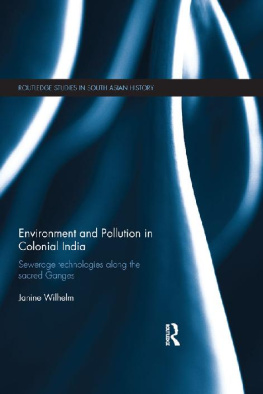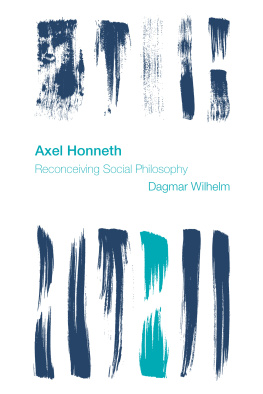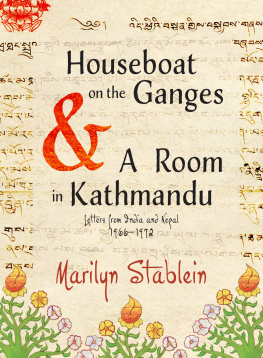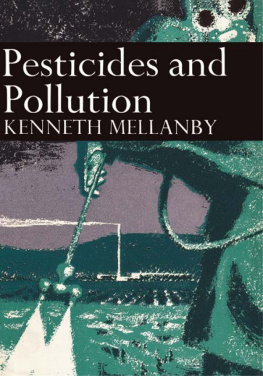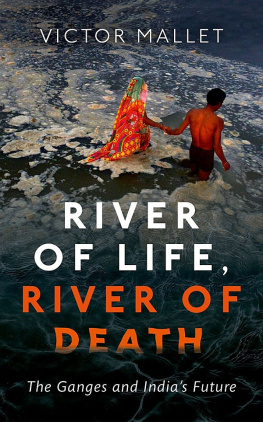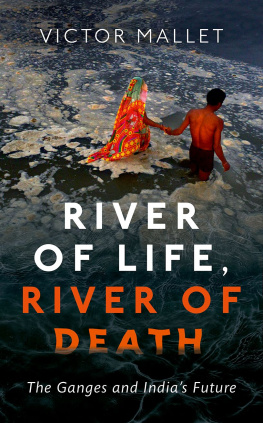Environment and Pollution in
Colonial India
India is facing a river pollution crisis today. The origins of this crisis are commonly traced back to post-Independence economic development and urbanisation. This book, in contrast, shows that some important early roots of Indias river pollution problem, and in particular the pollution of the Ganges, lie with British colonial policies on wastewater disposal during the late nineteenth and early twentieth centuries.
Analysing the two cornerstones of colonial river pollution history the introduction of sewerage systems and the introduction of biological sewage treatment technologies in cities along the Ganges the author examines different controversies around the proposed and actual discharge of untreated or treated sewage into the Ganges, which involved officials on different administrative levels as well as the Indian public. The analysis shows that the colonial state essentially ignored the problematic aspects of sewage disposal into rivers, which were clearly evident from European experience. Guided by colonial ideology and fiscal policy, colonial officials supported the introduction of the cheapest available sewerage technologies, which were technologies causing extensive pollution. Thus, policies on sewage disposal into the Ganges and other Indian rivers took on a definite shape around the turn of the twentieth century and acquired certain enduring features that were to exert great negative influence on the future development of river pollution in India.
A well-researched study on colonial river pollution history, this book presents an innovative contribution to South Asian environmental history. It is of interest to scholars working on colonial, South Asian and environmental history, and the colonial history of public health, science and technology.
Janine Wilhelm received her doctorate from Humboldt University Berlin in 2015. Her current research focuses on the environmental history of South Asias rivers, the history of modern Yoga and Yoga philosophy.
Routledge Studies in South Asian History
Historiography and Writing Postcolonial India
Naheem Jabbar
Nationalism, Education and Migrant Identities
The England-Returned
Sumita Mukherjee
Medicine, Race and Liberalism in British Bengal
Symptoms of Empire
Ishita Pande
Radical Politics in Colonial Punjab
Governance and Sedition
Shalini Sharma
The Great Rebellion of 1857 in India
Exploring Transgressions, Contests and Diversities
Biswamoy Pati
The State and Governance in India
The Congress Ideal
William F. Kuracina
Gandhis Spinning Wheel and the Making of India
Rebecca Brown
Gender and Radical Politics in India
Magic Moments of Naxalbari (19671975)
Mallarika Sinha Roy
Bureaucracy, Community and Influence in India
Society and the State, 1930s1960s
William Gould
A History of State and Religion in India
Ian Copland, Ian Mabbett, Asim Roy, Kate Brittlebank and Adam Bowles
Hindu Mahasabha in Colonial North India, 19151930
Constructing Nation and History
Prabhu Bapu
Cinema, Transnationalism, and Colonial India
Entertaining the Raj
Babli Sinha
Environment and Pollution in Colonial India
Sewerage Technologies along the Sacred Ganges
Janine Wilhelm
Environment and Pollution in
Colonial India
Sewerage technologies along the sacred
Ganges
Janine Wilhelm
First published 2016
by Routledge
2 Park Square, Milton Park, Abingdon, Oxon OX14 4RN
and by Routledge
711 Third Avenue, New York, NY 10017
Routledge is an imprint of the Taylor & Francis Group, an informa business
2016 Janine Wilhelm
The right of Janine Wilhelm to be identified as author of this work has been asserted by her in accordance with sections 77 and 78 of the Copyright, Designs and Patents Act 1988.
All rights reserved. No part of this book may be reprinted or reproduced or utilised in any form or by any electronic, mechanical, or other means, now known or hereafter invented, including photocopying and recording, or in any information storage or retrieval system, without permission in writing from the publishers.
Trademark notice: Product or corporate names may be trademarks or registered trademarks, and are used only for identification and explanation without intent to infringe.
British Library Cataloguing in Publication Data
A catalogue record for this book is available from the British Library
Library of Congress Cataloging in Publication Data
Names: Wilhelm, Janine, author.Title: Environment and pollution in Colonial India : sewerage technologies along the sacred Ganges / Janine Wilhelm.
Description: Abingdon, Oxon : Routledge, 2016. | Series: Routledge studies in South Asian history ; 15 | Includes bibliographical references and index.
Identifiers: LCCN 2015046131 | ISBN 9781138646124 (hardback) | ISBN 9781315627717 (ebook)
Subjects: LCSH: Water quality managementGanges River Watershed (India and Bangladesh) | Sewage disposal in rivers, lakes, etc.Environmental aspectsGanges River Watershed (India and Bangladesh) | Water quality managementGovernment policyIndia. | SewerageIndiaGovernment policy. | WaterPollutionGanges River Watershed (India and Bangladesh)History19th century. | WaterPollutionGanges River Watershed (India and Bangladesh)History20th century.
Classification: LCC TD304.G36 W55 2016 | DDC 628.30954/1dc23
LC record available at http://lccn.loc.gov/2015046131
ISBN: 978-1-138-64612-4 (hbk)
ISBN: 978-1-315-62771-7 (ebk)
Typeset in Times New Roman
by Wearset Ltd, Boldon, Tyne and Wear
Contents
This book is a revised version of my PhD thesis submitted at the Faculty of Humanities and Social Sciences at Humboldt University, Berlin. I would like to express my sincere gratitude towards my supervisor Prof. Dr. Michael Mann, who provided invaluable guidance and unfailing support throughout the process, while granting me the greatest creative freedom imaginable. I am also greatly indebted to my second supervisor Prof. Dr. Harald Fischer-Tin from the Swiss Federal Institute of Technology in Zurich, who contributed to this work with many insightful comments. During my two years of employment at his chair I enjoyed a most inspiring intellectual environment that proved to be highly conducive to my research.
The German Academic Exchange Service generously supported this project in 2011 and 2012 by funding two research stays at Jawaharlal Nehru University, New Delhi, as part of its exchange programme A New Passage to India. Logistic support was provided by the Graduate Centre Humanities and Social Sciences at Leipzig University, for which I would like to thank them. I would also like to thank the staff of all the archives and libraries I consulted for this work, including the indescribably kind and helpful staff at the British Librarys Asian and African Studies reading room, those of the National Archives of India, the Nehru Memorial Museum and Library, the Uttar Pradesh State Archives, and the Uttar Pradesh State Archives regional archives in Banaras. I am also deeply grateful to David Arnold, Mahesh Rangarajan, Melitta Waligora, Anna Mohr, Anita Breuer and Routledges anonymous reviewer(s) for their inspiring commentaries at various stages, and to Dorothea Schaefter and Jillian Morrison from Routledge for their unstinting support.

